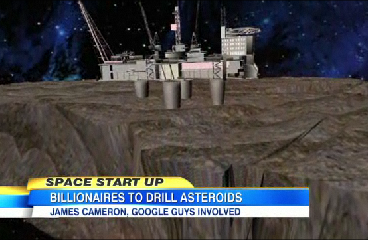Bevy Of Billionaires Back New Enterprise That Seeks To Extract Platinum From Asteroids
By: Kelly York
If we posted this story on the first of April you'd certainly think that we were pulling an April Fools prank, but this is as real as real gets.
The founders of a brand new enterprise called Planetary Resources revealed to the world on Tuesday that they have a plan to mine nearby asteroids for their rich content of precious metals, specifically platinum. Peter Diamandis, Chris Lewicki and Eric Anderson (below) made the announcement at a news conference Tuesday at the Museum of Flight in Seattle.
 If successful, the endeavor could yield billions, perhaps trillions, in riches. Investors from the ranks of the super-wealthy are already on board. The company says investors include Google co-founder Larry Page, Google chairman Eric Schmidt, Google investor K. Ram Shriram, former Microsoft chief software engineer Charles Simonyi, and H. Ross Perot Jr., son of the former presidential candidate.
Serving as an adviser is Hollywood's James Cameron, the man behind the blockbuster films "Titanic" and "Avatar."
If successful, the endeavor could yield billions, perhaps trillions, in riches. Investors from the ranks of the super-wealthy are already on board. The company says investors include Google co-founder Larry Page, Google chairman Eric Schmidt, Google investor K. Ram Shriram, former Microsoft chief software engineer Charles Simonyi, and H. Ross Perot Jr., son of the former presidential candidate.
Serving as an adviser is Hollywood's James Cameron, the man behind the blockbuster films "Titanic" and "Avatar."
 Certainly the technical challenges and risk factors of mining precious metal in outer space will be off the charts, but the billionaires behind Planetary Resources see a huge upside. They estimate that robots could be extracting cosmic riches within 10 years.
How do scientists know for certain that platinum is present on these asteroids? The simplest clues come from space rocks that have fallen to the Earth as meteoroids. They also utilize equipment that detects the distinct chemical signatures of the asteroids based on reflected light.
They believe a small asteroid about 79-feet long could have as much as 33,000 tons of extractable metal and possibly one ton of platinum group metals, according to a report in the April-May issue of the journal Acta Astronautica.
The Associated Press reported that there are approximately 1,500 asteroids – from a dozen feet wide to 10 miles long – that pass near Earth regularly and would be excellent initial targets. Scientists believe that 10 percent of these will yield valuable minerals.
"Since my early teenage years, I've wanted to be an asteroid miner. I always viewed it as a glamorous vision of where we could go," said Peter Diamandis at the news conference. The company's vision "is to make the resources of space available to humanity."
Certainly the technical challenges and risk factors of mining precious metal in outer space will be off the charts, but the billionaires behind Planetary Resources see a huge upside. They estimate that robots could be extracting cosmic riches within 10 years.
How do scientists know for certain that platinum is present on these asteroids? The simplest clues come from space rocks that have fallen to the Earth as meteoroids. They also utilize equipment that detects the distinct chemical signatures of the asteroids based on reflected light.
They believe a small asteroid about 79-feet long could have as much as 33,000 tons of extractable metal and possibly one ton of platinum group metals, according to a report in the April-May issue of the journal Acta Astronautica.
The Associated Press reported that there are approximately 1,500 asteroids – from a dozen feet wide to 10 miles long – that pass near Earth regularly and would be excellent initial targets. Scientists believe that 10 percent of these will yield valuable minerals.
"Since my early teenage years, I've wanted to be an asteroid miner. I always viewed it as a glamorous vision of where we could go," said Peter Diamandis at the news conference. The company's vision "is to make the resources of space available to humanity."
 Visit Ben David Jewelers on Facebook
Visit BenDavidJewelers.com
Visit Ben David Jewelers on Facebook
Visit BenDavidJewelers.com
 If successful, the endeavor could yield billions, perhaps trillions, in riches. Investors from the ranks of the super-wealthy are already on board. The company says investors include Google co-founder Larry Page, Google chairman Eric Schmidt, Google investor K. Ram Shriram, former Microsoft chief software engineer Charles Simonyi, and H. Ross Perot Jr., son of the former presidential candidate.
Serving as an adviser is Hollywood's James Cameron, the man behind the blockbuster films "Titanic" and "Avatar."
If successful, the endeavor could yield billions, perhaps trillions, in riches. Investors from the ranks of the super-wealthy are already on board. The company says investors include Google co-founder Larry Page, Google chairman Eric Schmidt, Google investor K. Ram Shriram, former Microsoft chief software engineer Charles Simonyi, and H. Ross Perot Jr., son of the former presidential candidate.
Serving as an adviser is Hollywood's James Cameron, the man behind the blockbuster films "Titanic" and "Avatar."
 Certainly the technical challenges and risk factors of mining precious metal in outer space will be off the charts, but the billionaires behind Planetary Resources see a huge upside. They estimate that robots could be extracting cosmic riches within 10 years.
How do scientists know for certain that platinum is present on these asteroids? The simplest clues come from space rocks that have fallen to the Earth as meteoroids. They also utilize equipment that detects the distinct chemical signatures of the asteroids based on reflected light.
They believe a small asteroid about 79-feet long could have as much as 33,000 tons of extractable metal and possibly one ton of platinum group metals, according to a report in the April-May issue of the journal Acta Astronautica.
The Associated Press reported that there are approximately 1,500 asteroids – from a dozen feet wide to 10 miles long – that pass near Earth regularly and would be excellent initial targets. Scientists believe that 10 percent of these will yield valuable minerals.
"Since my early teenage years, I've wanted to be an asteroid miner. I always viewed it as a glamorous vision of where we could go," said Peter Diamandis at the news conference. The company's vision "is to make the resources of space available to humanity."
Certainly the technical challenges and risk factors of mining precious metal in outer space will be off the charts, but the billionaires behind Planetary Resources see a huge upside. They estimate that robots could be extracting cosmic riches within 10 years.
How do scientists know for certain that platinum is present on these asteroids? The simplest clues come from space rocks that have fallen to the Earth as meteoroids. They also utilize equipment that detects the distinct chemical signatures of the asteroids based on reflected light.
They believe a small asteroid about 79-feet long could have as much as 33,000 tons of extractable metal and possibly one ton of platinum group metals, according to a report in the April-May issue of the journal Acta Astronautica.
The Associated Press reported that there are approximately 1,500 asteroids – from a dozen feet wide to 10 miles long – that pass near Earth regularly and would be excellent initial targets. Scientists believe that 10 percent of these will yield valuable minerals.
"Since my early teenage years, I've wanted to be an asteroid miner. I always viewed it as a glamorous vision of where we could go," said Peter Diamandis at the news conference. The company's vision "is to make the resources of space available to humanity."
If we posted this story on the first of April you'd certainly think that we were pulling an April Fools prank, but this is as real as real gets.
The founders of a brand new enterprise called Planetary Resources revealed to the world on Tuesday that they have a plan to mine nearby asteroids for their rich content of precious metals, specifically platinum. Peter Diamandis, Chris Lewicki and Eric Anderson (below) made the announcement at a news conference Tuesday at the Museum of Flight in Seattle.
<img src="https://media.tumblr.com/tumblr_m32jfnPpNz1r2j7ub.png" alt="" />
If successful, the endeavor could yield billions, perhaps trillions, in riches. Investors from the ranks of the super-wealthy are already on board. The company says investors include Google co-founder Larry Page, Google chairman Eric Schmidt, Google investor K. Ram Shriram, former Microsoft chief software engineer Charles Simonyi, and H. Ross Perot Jr., son of the former presidential candidate.
Serving as an adviser is Hollywood's James Cameron, the man behind the blockbuster films "Titanic" and "Avatar."
<img src="https://media.tumblr.com/tumblr_m32idkVZPV1r2j7ub.png" alt="" />
Certainly the technical challenges and risk factors of mining precious metal in outer space will be off the charts, but the billionaires behind Planetary Resources see a huge upside. They estimate that robots could be extracting cosmic riches within 10 years.
How do scientists know for certain that platinum is present on these asteroids? The simplest clues come from space rocks that have fallen to the Earth as meteoroids. They also utilize equipment that detects the distinct chemical signatures of the asteroids based on reflected light.
They believe a small asteroid about 79-feet long could have as much as 33,000 tons of extractable metal and possibly one ton of platinum group metals, according to a report in the April-May issue of the journal <em>Acta Astronautica.</em>
The Associated Press reported that there are approximately 1,500 asteroids – from a dozen feet wide to 10 miles long – that pass near Earth regularly and would be excellent initial targets. Scientists believe that 10 percent of these will yield valuable minerals.
"Since my early teenage years, I've wanted to be an asteroid miner. I always viewed it as a glamorous vision of where we could go," said Peter Diamandis at the news conference. The company's vision "is to make the resources of space available to humanity."
<img src="https://media.tumblr.com/tumblr_luuapjdCVY1r2j7ub.png" alt="" width="33" height="33" /><a href="https://www.facebook.com/bdjewelers"> Visit Ben David Jewelers on Facebook</a>
Visit <a href="https://www.bendavidjewelers.com">BenDavidJewelers.com</a>
